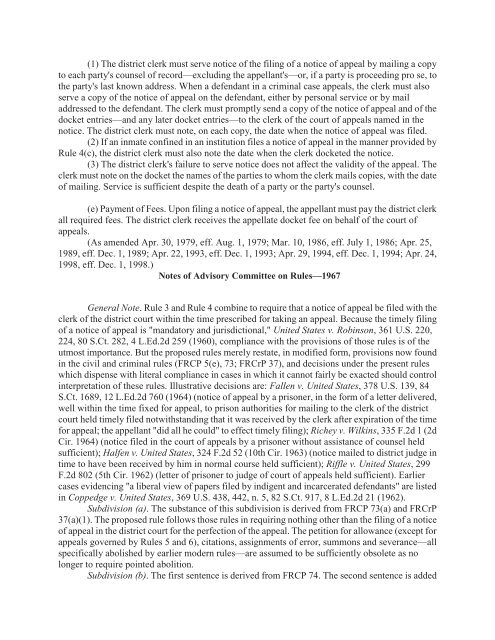Federal Rules of Appellate Procedure 2014-2015, 2014a
Federal Rules of Appellate Procedure 2014-2015, 2014a
Federal Rules of Appellate Procedure 2014-2015, 2014a
You also want an ePaper? Increase the reach of your titles
YUMPU automatically turns print PDFs into web optimized ePapers that Google loves.
(1) The district clerk must serve notice <strong>of</strong> the filing <strong>of</strong> a notice <strong>of</strong> appeal by mailing a copy<br />
to each party's counsel <strong>of</strong> record—excluding the appellant's—or, if a party is proceeding pro se, to<br />
the party's last known address. When a defendant in a criminal case appeals, the clerk must also<br />
serve a copy <strong>of</strong> the notice <strong>of</strong> appeal on the defendant, either by personal service or by mail<br />
addressed to the defendant. The clerk must promptly send a copy <strong>of</strong> the notice <strong>of</strong> appeal and <strong>of</strong> the<br />
docket entries—and any later docket entries—to the clerk <strong>of</strong> the court <strong>of</strong> appeals named in the<br />
notice. The district clerk must note, on each copy, the date when the notice <strong>of</strong> appeal was filed.<br />
(2) If an inmate confined in an institution files a notice <strong>of</strong> appeal in the manner provided by<br />
Rule 4(c), the district clerk must also note the date when the clerk docketed the notice.<br />
(3) The district clerk's failure to serve notice does not affect the validity <strong>of</strong> the appeal. The<br />
clerk must note on the docket the names <strong>of</strong> the parties to whom the clerk mails copies, with the date<br />
<strong>of</strong> mailing. Service is sufficient despite the death <strong>of</strong> a party or the party's counsel.<br />
(e) Payment <strong>of</strong> Fees. Upon filing a notice <strong>of</strong> appeal, the appellant must pay the district clerk<br />
all required fees. The district clerk receives the appellate docket fee on behalf <strong>of</strong> the court <strong>of</strong><br />
appeals.<br />
(As amended Apr. 30, 1979, eff. Aug. 1, 1979; Mar. 10, 1986, eff. July 1, 1986; Apr. 25,<br />
1989, eff. Dec. 1, 1989; Apr. 22, 1993, eff. Dec. 1, 1993; Apr. 29, 1994, eff. Dec. 1, 1994; Apr. 24,<br />
1998, eff. Dec. 1, 1998.)<br />
Notes <strong>of</strong> Advisory Committee on <strong>Rules</strong>—1967<br />
General Note. Rule 3 and Rule 4 combine to require that a notice <strong>of</strong> appeal be filed with the<br />
clerk <strong>of</strong> the district court within the time prescribed for taking an appeal. Because the timely filing<br />
<strong>of</strong> a notice <strong>of</strong> appeal is "mandatory and jurisdictional," United States v. Robinson, 361 U.S. 220,<br />
224, 80 S.Ct. 282, 4 L.Ed.2d 259 (1960), compliance with the provisions <strong>of</strong> those rules is <strong>of</strong> the<br />
utmost importance. But the proposed rules merely restate, in modified form, provisions now found<br />
in the civil and criminal rules (FRCP 5(e), 73; FRCrP 37), and decisions under the present rules<br />
which dispense with literal compliance in cases in which it cannot fairly be exacted should control<br />
interpretation <strong>of</strong> these rules. Illustrative decisions are: Fallen v. United States, 378 U.S. 139, 84<br />
S.Ct. 1689, 12 L.Ed.2d 760 (1964) (notice <strong>of</strong> appeal by a prisoner, in the form <strong>of</strong> a letter delivered,<br />
well within the time fixed for appeal, to prison authorities for mailing to the clerk <strong>of</strong> the district<br />
court held timely filed notwithstanding that it was received by the clerk after expiration <strong>of</strong> the time<br />
for appeal; the appellant "did all he could" to effect timely filing); Richey v. Wilkins, 335 F.2d 1 (2d<br />
Cir. 1964) (notice filed in the court <strong>of</strong> appeals by a prisoner without assistance <strong>of</strong> counsel held<br />
sufficient); Halfen v. United States, 324 F.2d 52 (10th Cir. 1963) (notice mailed to district judge in<br />
time to have been received by him in normal course held sufficient); Riffle v. United States, 299<br />
F.2d 802 (5th Cir. 1962) (letter <strong>of</strong> prisoner to judge <strong>of</strong> court <strong>of</strong> appeals held sufficient). Earlier<br />
cases evidencing "a liberal view <strong>of</strong> papers filed by indigent and incarcerated defendants" are listed<br />
in Coppedge v. United States, 369 U.S. 438, 442, n. 5, 82 S.Ct. 917, 8 L.Ed.2d 21 (1962).<br />
Subdivision (a). The substance <strong>of</strong> this subdivision is derived from FRCP 73(a) and FRCrP<br />
37(a)(1). The proposed rule follows those rules in requiring nothing other than the filing <strong>of</strong> a notice<br />
<strong>of</strong> appeal in the district court for the perfection <strong>of</strong> the appeal. The petition for allowance (except for<br />
appeals governed by <strong>Rules</strong> 5 and 6), citations, assignments <strong>of</strong> error, summons and severance—all<br />
specifically abolished by earlier modern rules—are assumed to be sufficiently obsolete as no<br />
longer to require pointed abolition.<br />
Subdivision (b). The first sentence is derived from FRCP 74. The second sentence is added


















